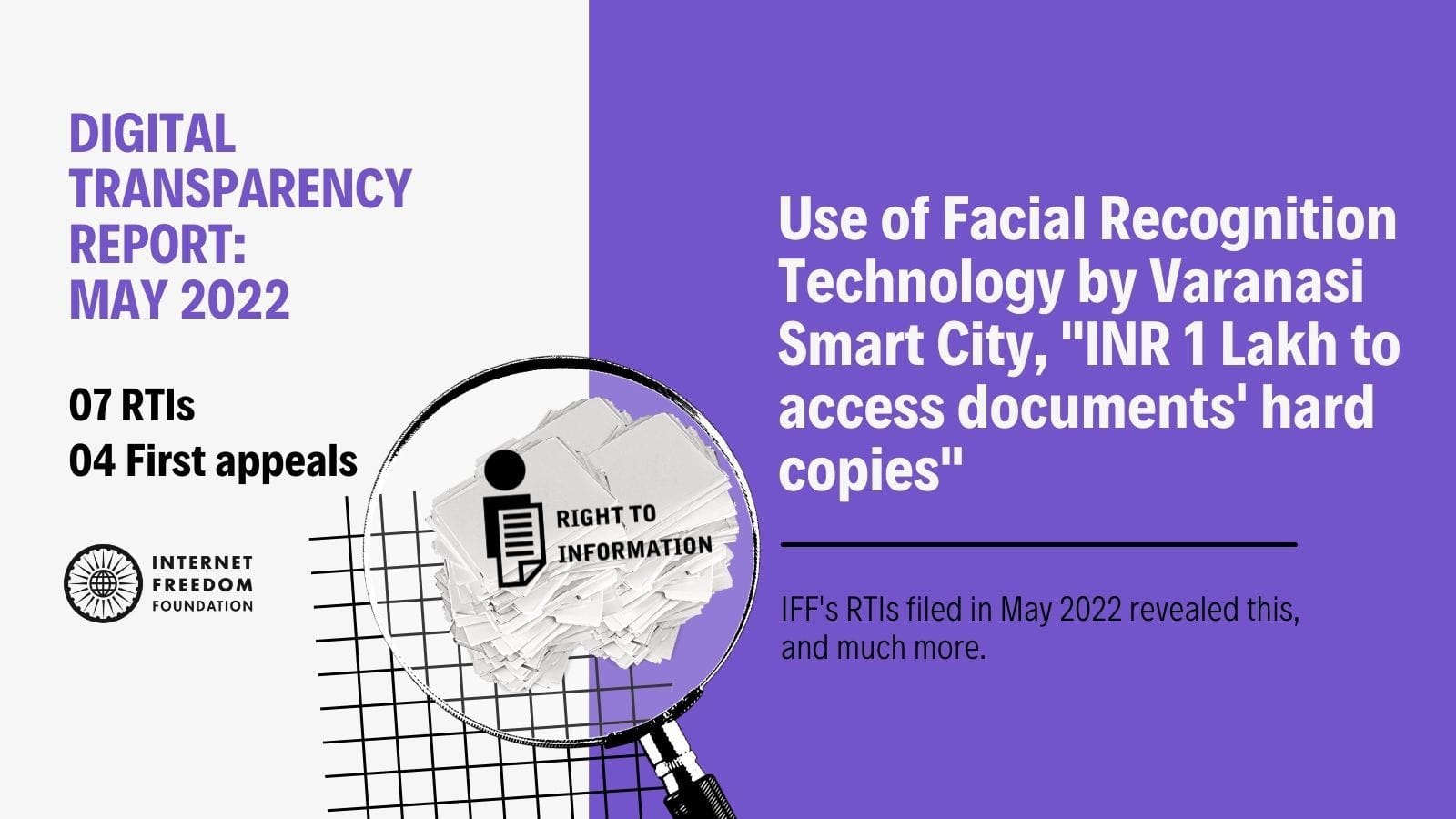
tl;dr
For the month of May 2022, IFF has filed 7 Right to Information (“RTI”) applications and 4 first appeals. In response to our RTI application to Varanasi Smart City on the use of facial recognition by them, the PIO requested a sum of one lakh rupees as fees for a hard copy of the documents, without specifying the number of pages the document contains. This is against the letter and spirit of the Right to Information Act, 2005 (“the Act” or “the RTI Act”) which provides that information be given to the applicants at the cost of Rs 2/- per page.
Why should you care?
The RTI Act was enacted to promote transparency and accountability in the working of every public authority by ensuring that citizens have access to information under the control of public authorities. Facilitating such access is necessary to ensure that democratic processes are not subverted by public authorities acting under private interests. Where transparency is not upheld as a value of public decision-making, citizens are at a disadvantage when it comes to keeping a check on abuse of power by the public authorities.
As we have discovered previously through responses received on our Right to Information applications, several times various government processes and programs continue with little or no transparency. This happens despite the mandate in the RTI Act, 2005 to proactively publish and disclose information to citizens.
The RTI Act is thus one of the most important tools at the disposal of the public to engage with, and demand transparency and accountability from, the Government. We use the Act to routinely extract information about various ongoing policies and projects that the Government launches.
Data Protection and Privacy
One of our key areas of work is ensuring that public authorities respect data privacy and engage in practices which will ensure that the right to privacy is protected. We filed 5 RTI applications and 1 first appeal with various authorities this month to ask for information pertaining to projects which affect the data privacy of Indian citizens.
Under IFF’s Project Panoptic, we routinely file RTI applications with various public authorities after we come across news reports that they are developing or using facial recognition technology (FRT). This month, we filed an application with the Uttar Pradesh government over the use of a facial recognition attendance system in all state universities.
For more information on the use of facial recognition technology and how it increases mass surveillance, visit IFF’s Project Panoptic.
Additionally, we also filed applications with:
- The Rajasthan state government on the Open Data policy of the state.
- The National Informatics Centre on the Aarogya Setu application.
- The Ministry of Electronics and Information Technology on the CERT-In cybersecurity directions issued on April 28, 2022.
- The Ministry of Home Affairs on the proposed e-Census in 2022.
We also filed a first appeal with
- The Bengaluru police and the Punjab Police Intelligence (1, 2) on their non-response to our RTI application on the use of facial recognition by them.
Significant responses received:
- In a response dated May 3, 2022, to our Right to Information application to Varanasi Smart City on the use of facial recognition by them, the PIO requested a sum of one lakh rupees as fees for a hard copy of the documents, without specifying the number of pages the document contains. This is against the letter and spirit of the Right to Information Act, 2005 (“the Act” or “the RTI Act”) which provides that information be given to the applicants at the cost of Rs 2/- per page.
Free Speech and Censorship
Another focus of our work is to ensure that freedom of speech and expression on the internet is protected and that unnecessary censorship does not lead to a chilling effect on people’s fundamental rights. For this, we routinely file RTI applications to demand accountability for instances that may hamper free speech on the internet such as website blocking or internet shutdowns.
In the last month, we have filed 2 RTI applications and 1 first appeal to demand accountability for violations of free speech on the internet with the Andhra Pradesh and the Odisha government on the internet shutdowns by them.
We also filed a first appeal with the Government of Uttar Pradesh on their non-response to our RTI application on the internet shutdowns by them.
Help us help you
In case you want us to file an RTI application on an issue which may include any active or proposed program, scheme or initiative of the government impacting the digital rights of citizens, you can fill out this blocksurvey form and we shall then file an RTI application with the concerned authorities. Alternatively, you can also write to us at [email protected].
Important Documents
- Digital Transparency: A Right to Information Report for April 2022 dated 06 May 2022 (link)
- Digital Transparency: A Right to Information report for March 2022 dated April 01, 2022. (link)
- Digital Transparency: A Right to Information report for February 2022 dated March 01, 2022. (link)
The post was drafted with the assistance of Gyan Tripathi, a fourth-year law student from Symbiosis International, Pune, and reviewed by IFF staffer Anushka Jain.
